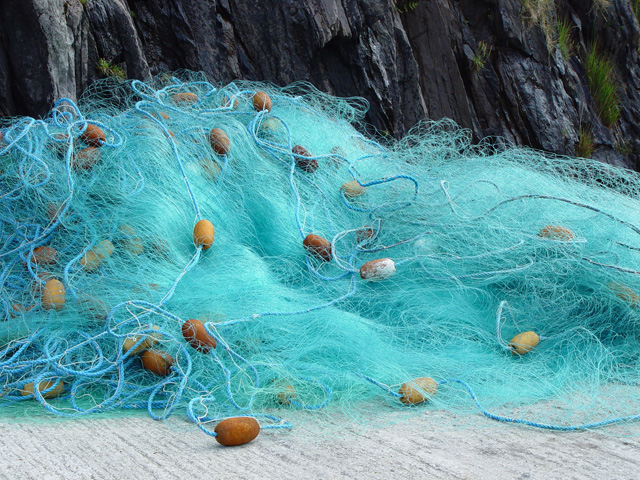Between oil taxes, marijuana regulation, mining, and the minimum wage, there’s a mess of ballot issues that Alaskans will have to decide on next summer. But a group of sportfishermen and guides is already looking toward 2016. They’ve introduced an initiative that would ban commercial set-net operations in the state’s urban areas, including Cook Inlet. APRN’s Alexandra Gutierrez reports.
Joe Connors operates a charter outfit on the Kenai Peninsula. His Big Sky Fishcamp has lots of amenities. There are cabins with names like “the Hawaiian Hut” and the “Hacienda of Happy Jose.” But the big attraction is obviously the fishing. If you go to Connors’ website, you’ll see photos of massive king salmon caught by proud clients.
There’s just one big snag with his operation. In recent years, he’s had fewer kings to fish. With lower returns, the state has had to put fishing limits on the valuable stock.
“You couldn’t troll out off the mouth of the Deep Creek or Anchor or Ninilchik [Rivers]. That was closed,” says Connors. “In the river, they had us fishing with single hook, no bait, and restricted to the lower 10 miles of the river.”
Now, Connors is heading up a new group called the Alaska Fisheries Conservation Alliance, and their goal is to shut down the commercial set-net fishery in the area.
That user group catches fish by anchoring nets to the shore. While the set-netters mostly target red salmon, they also take some kings. This year, they ended up with about 5,000 kings in their nets. Sportfishermen got a fraction of that.
Connors thinks the impact on the king run is too much, so the Alliance is pushing an initiative that would ban all commercial set netting in urban regions. He points to bans on the method in other states, and says it’s not an allocation issue but a conservation one. He adds that the state has not been doing its job in preserving the king stock.
“The Board of Fish and Game gets deluded by the need to continue the set-net fishery because it’s a way of life, you know, whatever, whatever. But the bottom line indicates — all the indicators — we have historically low numbers, and we cannot continue to have this wall of death functioning.”
The Alliance submitted their initiative application to the Alaska Division of Elections today. If the initiative passes legal review, the group would then have to collect signatures from 10 percent of the electorate to get on the ballot.
Set-netters in Bristol Bay, Kodiak, and along the Alaska Peninsula would not be targeted by the proposed ban, and neither would subsistence fisheries. And while the ban would apply to places like Fairbanks and Juneau, the Kenai Peninsula would see the greatest impact.
There are 750 set-net permits issued for the Cook Inlet region, with an estimated value of $10 million. While the initiative has language giving a rationale for the ban, it doesn’t say anything about what would happen to those permits. Connors says that the possibility of a buyback is something that could be worked out later.
“There might be discussion to that effect,” says Connors. That’s something that the public would have to decide if they want to have that discussion in the state also.”
Connors says he wants that discussion to happen over the course of a few years, which is why his group isn’t doing a major signature rush to get on the 2014 primary ballot. They’ve hired a public relations firm, and they plan to run a “voter education” effort. They also want to give the legislature some time to consider their proposal before it would actually go out to a vote.
“You can’t have an initiative process without allowing the Legislature to consider all these options also,” says Connors. “By going through the initiative process, we’re opening all of these other options. Whether the appropriate people step up and deal with it, we’ll see.”
The sportfishing lobby is a serious force in the state, and the Alaska Fisheries Conservation Alliance includes one of its most powerful players. Bob Penney, a Anchorage developer and major political funder, has already begun sending letters to legislators explaining the reason for this initiative. Earlier this year, a group he founded — the Kenai River Sportfishing Association — ran a successful campaign to unseat one of the governor’s appointees to the Board of Fish.
The initiative caught many set-netters by surprise. A spokesperson for the Kenai Peninsula Fishermen’s Association, which represents many of the area’s commercial fishermen, said they were “looking at the proposal and will have a response in the next day or two.”
Soldotna Sen. Peter Micciche was out of town on personal business Wednesday, but said he’s “going to continue to do what I need to do to protect all the fisheries in Cook Inlet. They’re all extremely important to our economy, to our recreation and to our way of life. I’m going to be active in the struggle to understand the importance of all our fisheries.”
This is the first citizen effort in Alaska to ban a gear-type via ballot. In 1995, an initiative to prioritize personal use over commercial fishing was introduced, but it did not come to a vote.
KDLL’s Shaylon Cochran and APRN’s Lori Townsend contributed reporting to this story.

